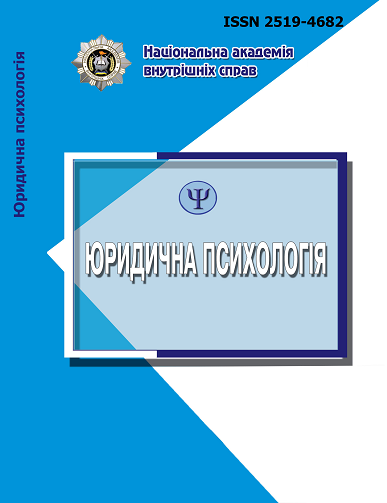Strategies of Obtaining Political and Legal Information under the Military Conflict in the East of Ukraine
Keywords:
students, sources of information, close social environment, educational environment, social institutions, the media
Abstract
The article presents the results of an empirical study of strategies for obtaining information of political and legal content by the students in the context of the military conflict in the East of Ukraine. In the process of theoretical analysis, sources are derived from the close social environment of the individual, educational environment of the university, the media and individual social institutions. The tendencies of their use for obtaining political and legal information are analyzed. It is revealed that the representatives of the close social environment are most trusted: members of the family, mates and friends. In the environment of higher education, teachers and classmates get the greatest trust. It is empirically proven that from the point of view of political and legal communications, the student group at the same time plays the role of both the educational environment and the student’s close social environment. There is proven point of complexity of the public positioning in the student’s environment of the political and legal position in which the events of the Revolution of Dignity (2013–2014) are regarded by the student as unlawful and unconstitutional. It has been determined that multiple media is the main source of information on political and legal content. Most students are using social networks and the magical websites. There is a wide spreader in the student community fear of tracking in social networks, which is overcome by strategies: 1) avoiding discussion on political and legal topics in the virtual space; 2) multiple virtual self-presentation using different accounts (including anonymous ones); 3) refusing to register in social networks. As for social institutions, it has been determined that the information which is received from volunteers and representatives of NGOs and movements gets the greatest trust from students. Representatives of the authorities and politicians are the anti-trust leaders of the student community.Downloads
Download data is not yet available.
Abstract views: 144 PDF Downloads: 51
Issue
Section
Theoretical and methodological issues of legal psychology
- Authors reserve the right to authorship of their own work and transfer to the magazine the right of the first publication of this work under the terms of the Creative Commons Attribution License, which allows other persons to freely distribute published work with mandatory reference to authors of the original work and the first publication of an article in this magazine.
- Authors have the right to enter into separate additional agreements on non-exclusive dissemination of the work in the form in which it was published in the journal (for example, to post an article in the institution's repository or to publish as part of a monograph), provided that the link to the first publication of the work in this journal is maintained.
- The journal's policy allows and encourages the posting of articles by authors on the Internet (for example, in electronic storehouses of institutions or on personal websites), both before the submission of this manuscript to the editorial office and during its editorial processing, as this contributes to the creation of a productive scientific discussion and positively affects the efficiency and dynamics of citing the published work.




